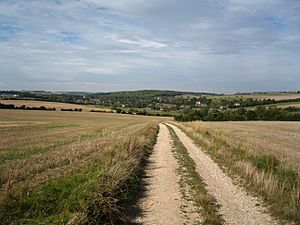Bockhampton, Berkshire facts for kids
Bockhampton (SU335782) is an abandoned village in Berkshire, England. It was once a small community but was "lost" in the late 1700s. Today, only a few signs remain of where the village once stood.
Contents
Where Was Bockhampton?
Bockhampton was located in Berkshire, a county in England. It sat right next to the River Lambourn. This river flows southeast from the town of Lambourn. Because it was downstream from Lambourn, Bockhampton was sometimes called Lower Lambourn. This helped tell it apart from Upper Lambourn, which was upstream.
A Village in the Domesday Book
Bockhampton is very old! It was even mentioned in the famous Domesday Book of 1086. This book was a huge survey ordered by King William the Conqueror. It recorded who owned land and what was on it.
In the Domesday Book, Bockhampton was called "Bochentone." It noted that people like Ralph the earl's son, Odo, and Edward held land there. They even had a mill! These landowners often held their land in exchange for serving the King. For example, some were responsible for looking after the King's hunting dogs, called harriers.
The Old Manor House
A big house called Bockhampton Manor House was built in the 1500s. It was first built by a man named Thomas Blagrave. Over the years, the house was rebuilt and changed in the 1600s and 1700s. This manor house became very important. It brought together three smaller old land areas: East Bockhampton, West Bockhampton, and Hoppeshortland.
Why Did Bockhampton Disappear?
The village of Bockhampton was "uprooted" in 1776. This happened because of a law called the 1773 Inclosure Act. This law allowed landowners to "enclose" or fence off large areas of land.
Before this, villagers often farmed small strips of land in big open fields. But in the 1700s, sheep farming became much more profitable. Landowners found they could make more money raising sheep than growing crops (called tillage). So, they decided to turn the village's farmland into large sheep pastures. This meant the villagers had to leave their homes.
What Remains Today?
Today, you won't find a busy village at Bockhampton. The land is now mostly sheep pasture. If you visit, you might see a road sign for Bockhampton on the Newbury Road. It points down Bockhampton Road towards the old site. The area is now near an electricity substation.
Images for kids





